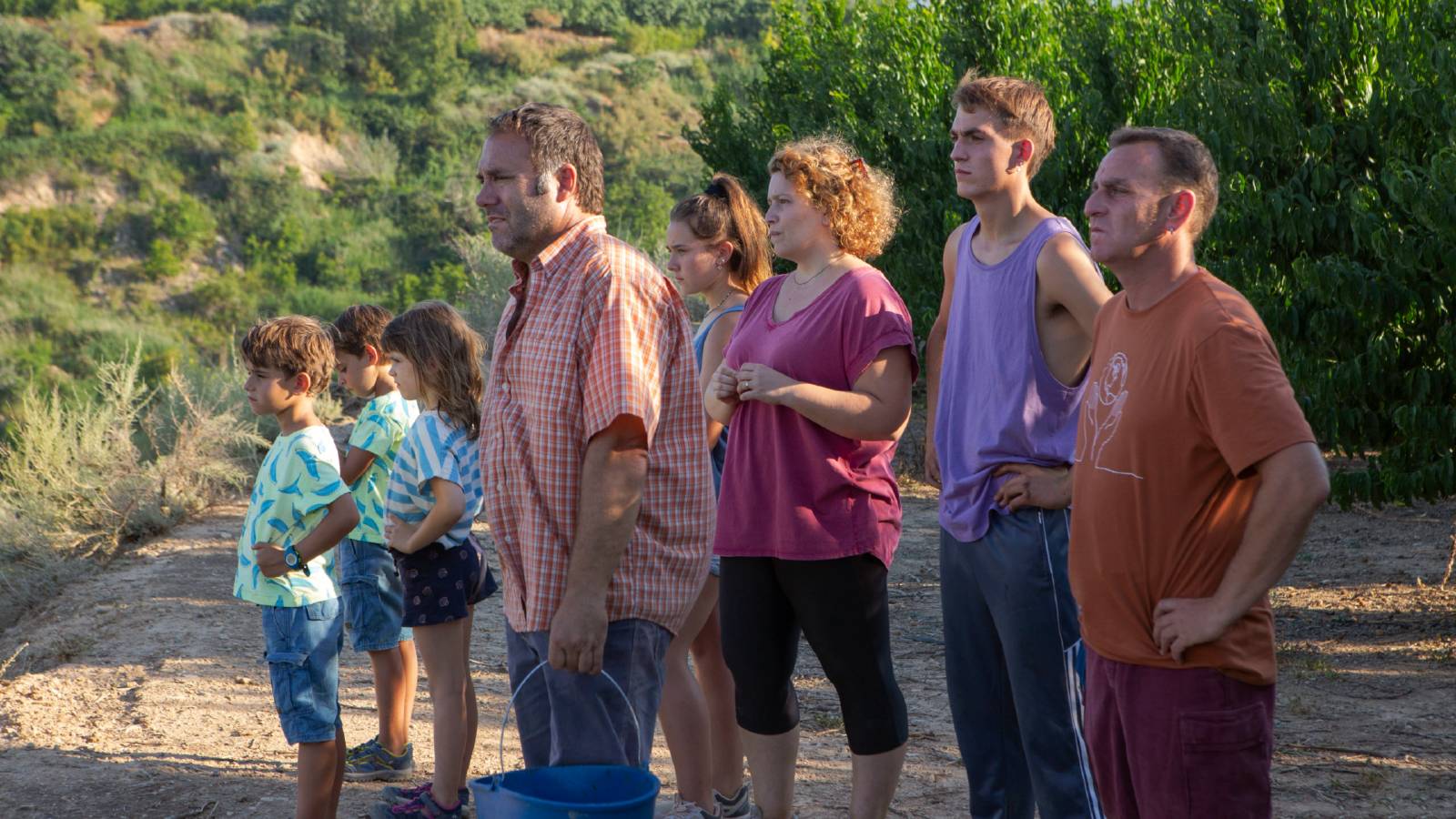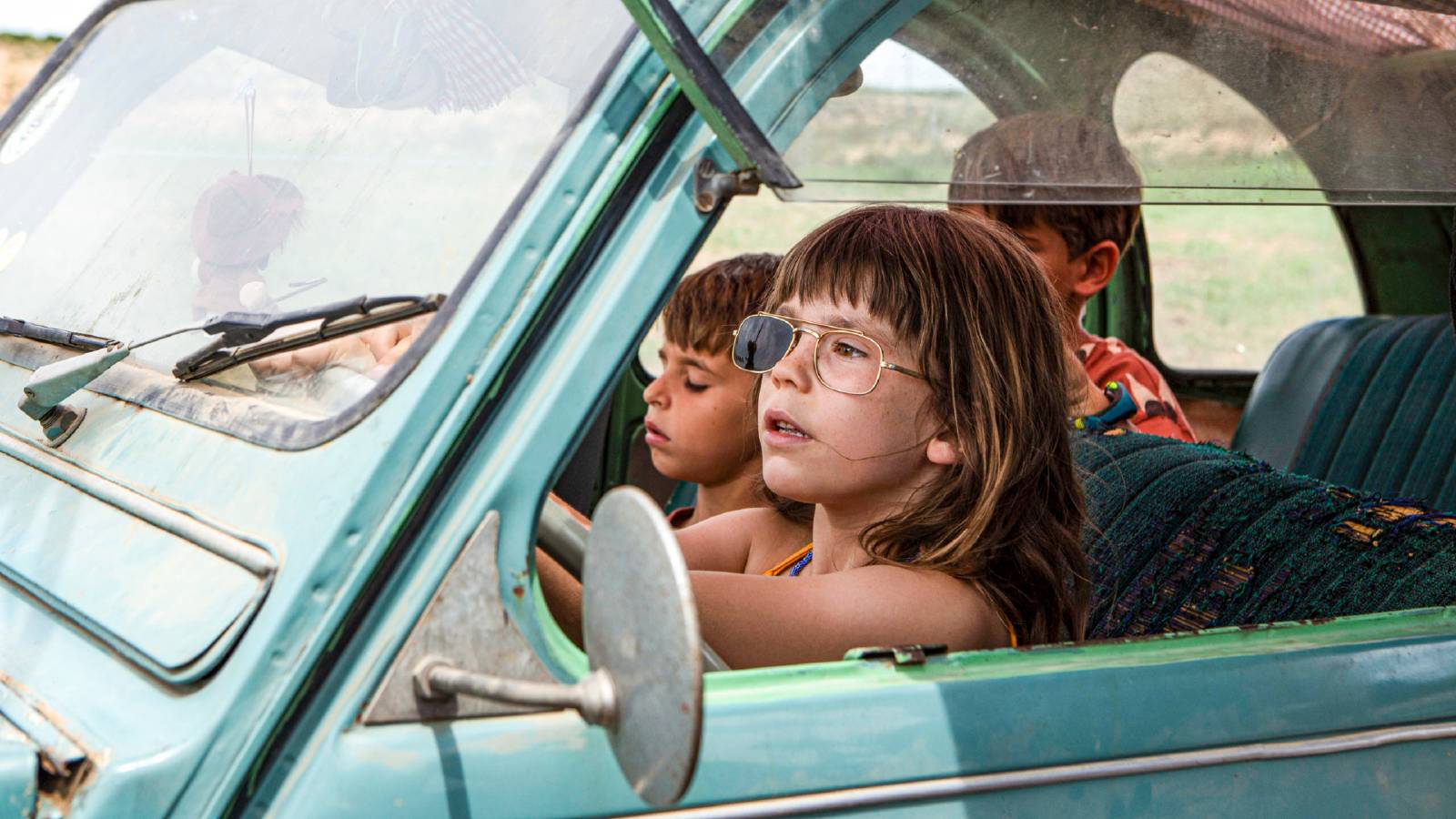The film Alcarràs opens with three young children playing in a decrepit sedan abandoned in an open field in the Catalan countryside, the car offering them shelter from the hot summer sun. So when a crew of construction workers comes to tow the junker away, the outraged children run home to share their misfortune with their parents, only to be quickly rebuffed. The adults, after all, have more important matters to deal with, namely the encroachment of a solar panel development on their peach farm. But the themes introduced in that first scene — transition, ownership, and the unintended consequences of “progress” — continue to haunt the characters throughout this strikingly beautiful film.
Alcarràs follows the Solé family, who have been working the same plot of land for generations. The property, however, is technically not theirs: It was gifted to them long ago by word of mouth. Without a legal document to prove their ownership, the peach orchards will be torn down by the end of the summer — and with them the only way of life that the family has ever known.
The film, which won the Golden Bear award at the Berlinale and was selected to be Spain’s 2023 Academy Awards submission, has the organic, unhurried quality for which director Carla Simón is known. Like her 2017 debut feature Summer, 1993, it is set in the Catalan region of Spain where she was raised and is powered by a particular sense of local knowledge, an understanding of both the pleasures and anxieties of rural life.
Played by a cast of non-professional actors, many of them from local farming families themselves, the film’s unvarnished style closely resembles that of a documentary, transporting the audience into the fields right alongside the characters. The result is so compelling you can almost smell the fruit and the yellow earth of the doomed peach orchard. This naturalistic storytelling approach offers a refreshing perspective on small-scale farm life at a time when the internet is brimming with idealized photos of sun-drenched solar developments promising a clean energy future.
At just around two hours, Alcarràs does not follow a straightforward narrative, which can make some scenes feel redundant, but there is something to appreciate in the way the film’s pacing mirrors agrarian life. At times, it passes slowly, with each day built around the rise and fall of the sun and the unrelenting task of picking the harvest.
Despite the painful uncertainty of what lies beyond those long days of field work, the film achieves a sort of levity, buoyed by the games of children and small moments of tenderness: the father, Quimet, drunkenly laughing at his sister for claiming to have spotted a UFO, the young cousins putting on a musical number at home, the teenage son and daughter playing a prank on the landowner who plans to tear down the farm.

Although Alcarràs is much more about loss and unwelcome change than the actual clean energy transition, Simón reminds us that things aren’t always so rosy for the people living on the front lines of alternative energy development. As the film progresses, solar panels begin to appear on the border of the family farm, contrasting with the lush, green rows of peach trees. In one particularly memorable shot, the grandfather pauses on a night stroll to gaze at the moonlight pooling on the surface of a hulking panel.
Simón does not linger on the significance of renewable energy as the force of change in the family’s life: Solar is just a new way of making money, of extracting more profit from the land. Nonetheless, the fictional film prompts consideration of how the renewable energy industry’s demand for vast open spaces is destabilizing small-scale farmers in the real world.
The rapid industrialization of agriculture over the past several decades has seen the decline of family farming globally, particularly in countries such as the U.S., the U.K., and Brazil. According to the International Labor Organization, the percentage of the global population that works in agriculture declined from 44 to 26 percent between 1991 and 2020, a trend that has coincided with massive demographic shifts to population centers. Today, cities are home to 70 percent of the world’s population, and that share is only expected to grow.
While it remains to be seen how much the transition to renewable energy will influence these trends, the story in Alcarràs focuses on the challenges associated with life in those shrinking rural communities. It reflects a conflict that is beginning to play out across the globe, as governments incentivize alternative forms of energy. Clean energy production will require far more land than fossil fuels, at least ten times more per unit of power according to one estimate. Since those renewable resources tend to be concentrated in remote areas, rural communities are disproportionately impacted by the growing industry.
While some farmers have sought to profit from large-scale solar and wind projects, others are beginning to push back. Last spring, for example, residents in rural Ohio protested a proposed solar project which would cover more than 1,800 acres of prime farmland. Small-scale farmers in upstate New York that lease their land from larger landowners have argued that they will be pushed out by energy companies who can afford to pay more per parcel of land. In Chile’s Atacama desert, local farmers are struggling with water shortages precipitated by lithium mining, an industry that will be vital for producing batteries to power electric vehicles.
In Catalonia, the threat of alternative energy is less direct. A recurring theme in Alcarràs is the weekly protests over federal wholesale pricing measures that diminish profits for farmers in the village. It’s an issue that is playing out in real towns; Simón met the man who plays Quimet, Jordi Pujol Dolcet, at one such protest. Consistently low prices are making small-scale agriculture less economically viable, forcing many Catalan farmers to sell their land or pursue other forms of profit.
While solar panels could offer some of these farmers a new path to eke out a living, Simón’s script makes clear that it is not the livelihood that many of them truly desire. To the characters in the film, the farm that will be razed at the end of the summer is more than a piece of land; it is a broker of their relationships with one another. If the story levies a critique against any system, it’s the engine of capitalism, which incentivizes the endless consumption of resources at the expense of communities at the points of extraction.
In its best moments, Alcarràs gives viewers a deep sense of what it’s like to inhabit this family’s world in the moment before it changes irreparably, an appreciation for the immensity of what is to be lost.



